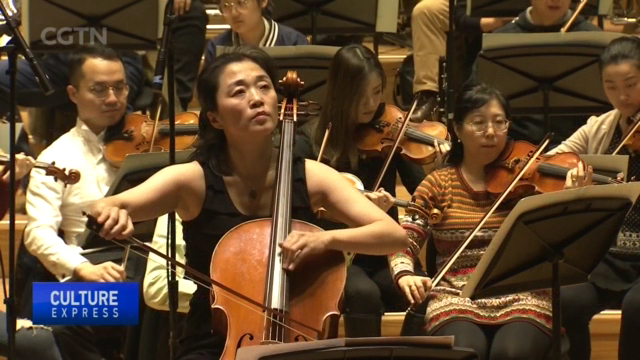
18:30, 14-Nov-2018
An Chengbi: Classically trained cellist takes on legendary Korean folk tune
Updated
17:47, 17-Nov-2018
04:36

Arirang. It's been known for centuries around the world as the quintessential Korean folk song. Now, composer An Chengbi is taking on the classic tune, and adding his own modern twist. CGTN's Shen Li sat down with the composer to talk about his inspirations for creating his new cello concerto "Arirang" and how his electronic acoustic training helped him in the creative process.
A folk classic reinvented. Performed by China's National Symphony Orchestra, this cello concerto featuring the classic Korean folk tune Arirang is the latest creation of composer An Chengbi.
An active composer on both the classical and modern music scenes, An first graduated from the Shanghai Conservatory of Music. Later, he went on to National Superior Conservatory of Paris for Music and Dance, where he studied composition and electronic music with composer Gérard Grisey.
As an ethnic-Korean born in China, An said taking on Arirang was a daunting but honorary task.
SHEN LI BEIJING "Tell us a bit more about the creative process of your new cello concerto 'Arirang'."
AN CHENGBI COMPOSER "Arirang is so iconic, it is the national anthem for the whole of the Korean peninsula. Because I always write modern pieces, and to tackle such classic folk music is quite daunting. What I did was first study the tune and tease out certain coherent themes that run through it. Then, I dissected the song down to its distinct single cells, and reconstructed it anew. So this cello concerto is a brand new take on the classic, but it,s still Arirang at its core."
SHEN LI BEIJING "Arirang is a traditional tune into which you've incorporated elements of electronic music. Is it a modern sounding piece? What's the most important thing when reinventing classics?"
AN CHENGBI COMPOSER "As a modern composer, I like to take on risk, but I don't want Arrirang to get deformed or distorted. I want to keep its essence, its original touch. I don't want to contaminate it too much with my personal touch. Electronic-acoustic music is very different from the kind of electronic music you'd see on a nightclub dance floor. Take a sound like the rustling of papers, for example. We musicians can manipulate the sound digitally and transform it into something beautiful, something that's completely unrecognisable. It's a musician's job to discover something new. And what we do is to look for the extraordinary that's hiding within the ordinary."
SHEN LI BEIJING "You've helped initiate the Electro-Acoustic Music Center at the Shanghai Music Conservatory. What inspired you to do that? How does this new blood affect the classical music scene in China?"
AN CHENGBI COMPOSER "Professor Yang Liqing at the Shanghai Music Conservatory invited me to set up a center for electronic-acoustic music. And we really built everything from the ground up. But I think it's great training for musicians and composers alike, because with electronic-acoustic music, the technology is constantly changing, you have to keep your skills sharp and learn about new trends, adapting them to your creations. And in turn, this training in the 'decomposition' of music has also helped me in composing symphonies and chamber music."
SHEN LI BEIJING "Is there any theme that you would like to try in the future?"
AN CHENGBI COMPOSER "I would very much like to take on the Chinese folk song 'Jasmine Flower'. Like 'Arirang' it has a simple but very catchy feel to it. And it's also written in five pitches, so the structure is familiar too. I think a modern symphonic version would be very interesting. We've seen many renditions, so it would be quite challenging to make it stand out."

SITEMAP
Copyright © 2018 CGTN. Beijing ICP prepared NO.16065310-3
Copyright © 2018 CGTN. Beijing ICP prepared NO.16065310-3